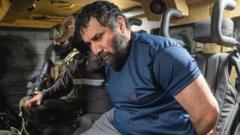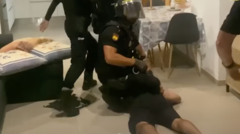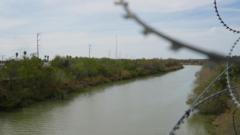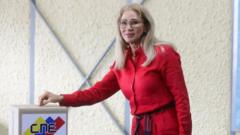Hugo Carvajal's guilty plea not only exposes his past but may also unsettle Venezuela's current power structures, as he potentially holds critical information against Nicolás Maduro and his regime.
Hugo Carvajal's Guilty Plea Marks a Turning Point in Venezuela's Drug War
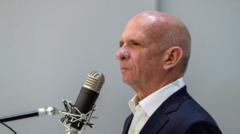
Hugo Carvajal's Guilty Plea Marks a Turning Point in Venezuela's Drug War
Former Venezuelan intelligence chief admits to narco-terrorism, revealing connections to military and drug cartels
In a stunning turn of events, Hugo Carvajal, Venezuela's former head of military intelligence, has pleaded guilty in the United States to charges of drug trafficking and narco-terrorism. Known infamously as "El Pollo," or The Chicken, the 65-year-old ex-official was implicated by US authorities in a drug-smuggling network consisting of high-ranking members of the Venezuelan military. This guilty plea signifies the dramatic fall from grace for Carvajal, who once wielded considerable power and instilled fear as a key ally of late President Hugo Chávez.
Following a secretive life that culminated in a clandestine arrest in Madrid—where he was reportedly hiding under disguise—Carvajal's admissions are surfaced as vital links to the Cartel de los Soles (Cartel of the Suns). According to a statement from the US Attorney's Office for the Southern District of New York, Carvajal and associates leveraged cocaine as a means of destabilizing the United States, flooding cities like New York with illicit substances.
Moreover, the indictment highlights Carvajal's alleged collaboration with Colombia's Revolutionary Armed Forces (FARC), which involved providing military equipment in exchange for their cocaine shipments to the US. The allegations suggest that he received significant financial gains for his participation in this network. The timing of his guilty plea raises questions as it comes two years after he previously denied these charges, hinting that he might have struck a deal for reduced sentencing by divulging crucial insights about the Maduro regime.
Maduro, embroiled in his own controversies, has faced "narco-terrorism" charges from US authorities for years, alongside sanctions aimed at crippling his government. Carvajal's long history of dissent against Maduro—from vocal support of opposition protests to a failed attempt at a coup—has further complicated their relationship.
Fleeing to Spain as tensions peaked in 2019, Carvajal managed to evade capture for years before ultimately being extradited to the US. With access to intimate knowledge of the inner workings of both Chávez and Maduro's regimes, Carvajal is now positioned to become a potentially pivotal figure in the unfolding narrative of Venezuela's drug war and political crisis.
Following a secretive life that culminated in a clandestine arrest in Madrid—where he was reportedly hiding under disguise—Carvajal's admissions are surfaced as vital links to the Cartel de los Soles (Cartel of the Suns). According to a statement from the US Attorney's Office for the Southern District of New York, Carvajal and associates leveraged cocaine as a means of destabilizing the United States, flooding cities like New York with illicit substances.
Moreover, the indictment highlights Carvajal's alleged collaboration with Colombia's Revolutionary Armed Forces (FARC), which involved providing military equipment in exchange for their cocaine shipments to the US. The allegations suggest that he received significant financial gains for his participation in this network. The timing of his guilty plea raises questions as it comes two years after he previously denied these charges, hinting that he might have struck a deal for reduced sentencing by divulging crucial insights about the Maduro regime.
Maduro, embroiled in his own controversies, has faced "narco-terrorism" charges from US authorities for years, alongside sanctions aimed at crippling his government. Carvajal's long history of dissent against Maduro—from vocal support of opposition protests to a failed attempt at a coup—has further complicated their relationship.
Fleeing to Spain as tensions peaked in 2019, Carvajal managed to evade capture for years before ultimately being extradited to the US. With access to intimate knowledge of the inner workings of both Chávez and Maduro's regimes, Carvajal is now positioned to become a potentially pivotal figure in the unfolding narrative of Venezuela's drug war and political crisis.

